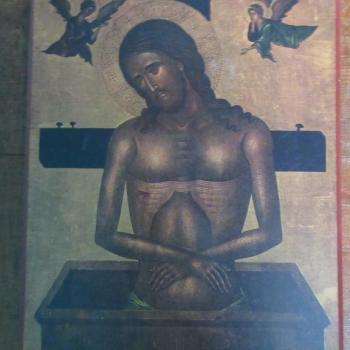Shifting gears here at Vox Nova, I thought I would follow Henry by providing a more spiritual reflection in anticipation of the Easter Triduum. The question as to how grace saves is a divisive one. Here are some of my own thoughts:
Colossians 1:15-24 contains what may appropriately be called not only one of Paul’s most profound and exalted Christological and ecclesiological teachings, but also one of his most illuminating insights on salvation. The passage forms, in my opinion, a cohesive whole, progressing from the supremacy and majesty of Christ (1:15), to his Lordship over creation as its Source and Maker (1:16-17), to His headship over His body on earth (1:18), to the specific members of the body (in this case, the Colossians) and their need to presevere in faith (1:21-23), to a single representative of the faith (Paul) who demonstrates the truest way of salvation: suffering with and in Christ (1:24). Using this hymn from Colossians as an outline, here is a biblical meditation on how Catholics understanding their salvation:
Jesus Christ, the image and manifestation of God (cf. Wis 7:26; John 1:1), is the cause of the cosmos and is King and Lord over it (cf. Mic 5:1-2; Is 9:6; Phil 2:9-11; Rev 17:14). He is the pre-existent One (cf. Prv 8:22), the Wisdom and operative hand of the invisible God, revealing His very nature and character to humanity (cf. Gen 1:1; Jn 1:1; Ps 33:6; Wis 7:22; Jn 14:8-11). He is before all things, with God from eternity (cf. Sir 34:3-5), the ultimate goal of the created order–all is ordered toward him alone. Even the highest and most splendid part of creation is nothing compared to his glory and power, for it is only by his word that it subsists and has being (John 1:2-3; Acts 17:28; Heb 2:10-11).
Chirst is the head of his Church, the guarantor of redemption and truth (cf. 1 Tim 3:15). He is the source of its life and he exercises complete dominion over it (cf. Acts 3:14; Wis 9:1-2), yet the Church is united to him and has its being in him so that his fullness dwells within it. (cf. Eph 1:22-23; Acts 9:4-5). He has purchased his people with his own blood and flesh (Heb 2:14-15; 1 Pt 1:18-19), through his own body he is both sacrifice and high priest, offering eternal mediation on their behalf (1 Tim 2:4-5; Heb 2:17-18, 6:19-20). Christ has tasted the bitterest of sufferings, descending like a slave (Phil 2:7-8) into the hell of hopelessness only to preach to the dead so as to take them up with him when he was to be raised (1 Pt 3:18-22). Through his Resurrection as firstborn from the dead, the Church’s members comprise a new humanity that is destined to rise with and in him (cf. 1 Cor 15:20; Acts 26:23). Christ is pre-eminent in creation and life, holding primacy over all things (cf. Sir 24:6)! Now, in the Church, his redemption fills all in all, the means for which humanity may be reconciled to God.
The Christian’s old sinful ways are crucified and put to death. The Christian now is reconciled to God (Rom 8:5-11; 1 Cor 6:9-11; 2 Cor 5:18-19; Heb 12:26), to be offered in grace as a pure sacrifice in imitation of the Master (Rom 12:1; 1 Pt 2:22-25). The Christian is to be afflicted, becoming like Christ in death (Phil 3:10) so that Christ may be manifested in the flesh (2 Cor 4:10-11) and so that the Christian may be glorified (Rom 8:17). While the sacrifice of Christ on the cross is all sufficient for forgiveness and redemption (Heb 7:27, 9:12-26), the suffering of the Christian is the actualization and application of Christ’s merit (Acts 14:22; 1 Thes 3:3-7).
The Christian must persevere, remaining unwavering in his conviction in order to obtain the salvation that is promised (Hab 2:4; Mark 13:13; Heb 10:36; Rom 11:22-23). Ultimately, the Chirstian must conform to Christ, participating in his sufferings in order to fully put to death the sins of the flesh and to live by the Spirit and inherit that which he is now heir to (cf. Rom 8:12-17; 2 Cor 1:5-7; Mt 5:11-12, 16:24). It is by the Holy Spirit that the Christian’s sufferings are meaningful and redemptive (1 Cor 12:13-26), and through the same Spirit that the Christian is made a child of God (Rom 8:14-17).
The Christian is not saved by faith alone (Jas 2:14-26), but by grace alone (Eph 2:8-9) through a faith that is not mere belief, but through a faith that is completed by obedience (Rom 1:5, 16:26) and love (Gal 5:6), that is, by keeping the commandments of the Lord (Jn 15:6-10; Gal 5:17-21) and working out salvation in acts of charity and goodwill (Mt 25:31-46; Phil 2:12-13). Indeed, faith is never without works.
Salvation is only by Jesus the Lord, only through a commitment to faith by means of grace, and only through suffering in conformity with he who conquers death and desires to exult humanity within himself. To imitate Christ is to believe in the plan of God, to obey the plan of God and to act out the plan of God. To reject any aspect of this imitation as necessary for salvation is to reject the very Word that saves.












